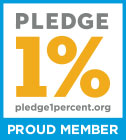Texas Cowboys Can Teach Us How To Use Payments To Protect The Planet
 When asked whether they desire to safeguard against climate change, a significant majority of consumers in various countries respond positively. However, their actions do not align with their intentions.
When asked whether they desire to safeguard against climate change, a significant majority of consumers in various countries respond positively. However, their actions do not align with their intentions.
A study by Kantar, for instance showed that 92% of people say they want to live a sustainable life yet only 16% are actively changing their behaviours. So, how can payments companies that want to protect the environment get more consumers to take action? Learn from the cowboys in Texas.
Payments Companies Go Green with Traditional Campaigns
Amidst growing consumer demand for green solutions and increasing regulatory and societal developments pushing for more eco-friendly actions, payments companies have proactively introduced initiatives as early as December 2019:
- Bank of the West announced a new account called “1% for the Planet” that uses cheque and debit card payments data to show customers insights into the carbon footprint of their purchases.
- The Baltic Sea Card from Ålandsbanken has an Åland Index which enabled customers to see the impact of their card purchases and empowered them to make better, more environmentally conscious choices.
- FutureCard Debit Card offered rewards to their cardholders who spend with a lower carbon footprint. They received a generous 6 percent cash back at Future Partners and 5 percent cash back on public transport, electric charging, bikes & scooters, renewed clothes, and plant-based alternatives for meat, dairy and eggs.
In Sweden, Thales said, Doconomy is seeking to inspire reduced consumption and personal changes in behaviour with the digital banking service DO.
The credit card is connected to a Do app that displays carbon impact metrics alongside the transactions so that cardholders can track and measure their carbon footprint for each purchase and compensate for its impact.
As Idemia said, a plastic payment card is the most recognisable symbol of a bank and its values for the bank’s customers. Issuers around the world are thus using the card as a lever both for customers to support environmental causes and to show that they are eco-friendly.
“The opportunity to use a credit card specifically engaged known reward brain networks, and especially those involved in anticipation and craving. These regions have also been associated previously with consumption of addictive substances.” – Drazen Prelec, MIT Sloan Professor
Beyond Points to Persuasion – Don’t Mess with Texas
While these programmes are all good in helping the planet with conservation efforts, their impact on persuading individuals who are not already environmentally conscious to change their behaviours may be limited. Additionally, many credit cards simply encourage more purchases without considering their environmental impact.
Research conducted by Drazen Prelec, a professor at MIT Sloan, revealed that the use of credit cards enhances the pleasure associated with making purchases. “The opportunity to use a credit card specifically engaged known reward brain networks, and especially those involved in anticipation and craving. These regions have also been associated previously with consumption of addictive substances,” such as cocaine or amphetamines.
Banks need to go beyond giving tools and data, by creating a community and inspiring actual action by their customers. So, how can payments companies that want to protect the environment get more consumers to take action? Payments companies could use the nudge theory, popularized by Nobel Prize-winning economist Richard Thaler, to get consumers to act and to grow their own businesses.
Consumers really do care about conservation, according to Rockbridge’s research, and they are open to green-oriented products and services. The study also suggests that “An opportunity exists for building a brand and solidifying customer loyalty through a carefully targeted marketing program based on a sincere desire to partner with customers. Many consumers are waiting for financial services providers to create opportunities to help them achieve their green dreams.”
Financial institutions can use psychological targeting, as explained by Sandra Matz, an Associate Professor at the Columbia Business School. By tapping into how people think, feel, and behave, personality types can be used to predict people’s preferences for marketing messages and communication styles. Psychological targeting allows companies to translate behavioural data into personalised customer profiles, which can help sell consumer products and also be a powerful tool for “nudging” people towards improving their lives. With AI, analysing and identifying target customers as well as understanding their motivations have become more accessible than ever before.
“Many consumers are waiting for financial services providers to create opportunities to help them achieve their green dreams.” - Rockbridge, Banking on Green: Responding to Consumer Concerns about the Environment
One example of a highly successful and enduring campaign is Don’t Mess with Texas. In the late 1980s, the Texas Department of Transportation was spending $20 million annually on trash pick-up, with the costs increasing by 17 percent each year. Traditional ads were ineffective in changing behaviours, prompting the department to put out a request for a marketing campaign. This led to the creation of a catchy slogan, “Don’t Mess with Texas.”
A key factor to its success was the identification of the ad’s target audience. The research revealed that men between the ages of 16 and 24 were the primary offenders. So, to engage this demographic, actors, influencers, and even actual cowboys were enlisted to support the campaign. The campaign officially launched on television in 1986 with a commercial featuring famous Texas blues musician Stevie Ray Vaughan, who delivered the commanding slogan “Don’t Mess with Texas.”
Throughout the years, the agency released several other commercials, including one featuring two huge Dallas Cowboys football players collecting litter by the side of the road. By 1990, these ads had successfully convinced tough Texas cowboys to refrain from littering, resulting in a 72 percent reduction in trash. The campaign continues today, featuring recognisable Texan actors. It has fostered a proud community that takes action.
Use the Texas Cowboy Method to Promote Green Payments – and Increase Revenue
To drive meaningful change that positively impacts people and the planet, payments companies need to go beyond just providing data or suggestions and running standard ads. Instead, they should leverage behavioural psychology, cultivate a community, and utilise role models to inspire action. An initial step is to identify target customers to influence, extending beyond people who are already taking action. Companies can then engage influencers or actors to exemplify the right behaviour for these targets, share customer stories that highlight a reduction of their carbon emissions, and create a community that proactively takes action. While the current programmes are good, a lot can be improved to create meaningful change and positively impact others and the planet.
Author: Richard Hartung, Associate, Singapore, Payments Consulting Network
An experienced professional with over 20 years of expertise in the payments and consumer financial services industry, specifically in the Asia Pacific region. He has held various key roles in renowned organizations such as Citibank, Mastercard, and OCBC Bank, and has established his own consultancy, Transcarta, assisting financial services companies with strategy, operations improvement, and market research.
***
If you found this article helpful and would be interested in reading similar articles, please subscribe to our newsletter.
Are you interested in reading articles on a particular payments topic, company, payments industry executive or author? Click the search icon, it’s that magnifying glass on the top right-hand side of the website and type in the keywords that interest you. You will then be presented with a list of any articles that match your search criteria.




